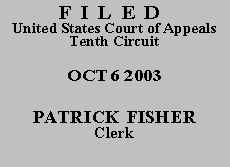

| GERALD ARNOLD WIEDEMANN;
DANIEL R. CHURCHILL; ROBERT
D. LANE; JAMES RAY HANKINS,
Plaintiffs-Appellants, v. THE CITY OF OKLAHOMA CITY, a political subdivision of the State of Oklahoma, Defendant-Appellee. |
|
Plaintiffs appeal from the district court's grant of summary judgment to defendant in this civil rights suit brought under 42 U.S.C. § 1983 alleging retaliatory and constructive discharge in violation of plaintiffs' First Amendment rights. We affirm.
The parties are familiar with the facts and we need not repeat them in detail here. Plaintiffs were all discharged (Mr. Hankins alleges that he was constructively discharged) from their jobs as electrical inspectors for the defendant City of Oklahoma City. Plaintiffs contended that they were discharged in retaliation for speaking out on a matter of public concern, specifically, health and safety matters related to their duties as electrical inspectors. Defendant asserted that plaintiffs were discharged for falsifying time reports and misusing work time. Messrs. Wiedemann, Churchill, and Lane grieved their discharges under their union's collective bargaining agreement and were ordered reinstated by the arbitrator. Mr. Wiedemann also grieved other matters with success in a separate arbitration proceeding. Mr. Hankins did not file a grievance, but joined in this suit. The district court granted summary judgment to defendant on the basis that plaintiffs failed to present evidence that they were discharged pursuant to a custom, policy, or practice and, therefore, defendant, as a municipality, could not be held liable under § 1983. See Monell v. Dep't of Soc. Servs. of City of New York, 436 U.S. 658, 694 (1978).
Plaintiffs argue on appeal that the district court erred: (1) in refusing to give preclusive effect to the arbitrators' findings that defendant failed to advance legitimate, non-discriminatory reasons for discharging plaintiffs; and (2) in holding that plaintiffs failed to show that defendant had established a custom, policy, or practice that led to their discharge.
"We review a grant of summary judgment de novo, applying the same standard as the district court under Fed. R. Civ. P. 56(c)." Scarberry v. ExxonMobil Oil Corp., 328 F.3d 1255, 1256 (10th Cir. 2003). Summary judgment is warranted "if the pleadings, depositions, answers to interrogatories, and admissions on file, together with the affidavits, if any, show that there is no genuine issue as to any material fact and that the moving party is entitled to a judgment as a matter of law." Rule 56(c).
Plaintiffs' first argument is without merit. The Supreme Court has held "that 'in a § 1983 action, a federal court should not afford res judicata or collateral-estoppel effect to an award in an arbitration proceeding brought pursuant to the terms of a collective-bargaining agreement.'" Ryan v. City of Shawnee, 13 F.3d 345, 347 (10th Cir. 1993) (quoting McDonald v. City of West Branch, 466 U.S. 284, 292 (1984)). Since McDonald, the Court no longer views "arbitration [as] inferior to the judicial process for resolving statutory claims." Gilmer v. Interstate/Johnson Lane Corp., 500 U.S. 20, 34 n.5 (1991). Cf. McDonald, 466 U.S. at 291 (holding that "arbitration is an inadequate substitute for judicial proceedings). The Court has reiterated, however, that the conclusion that arbitration under a collective-bargaining agreement does not preclude a subsequent statutory claim is supported by the "difference between contractual rights under a collective-bargaining agreement and individual statutory rights, the potential disparity in interests between a union and an employee, and the limited authority and power of labor arbitrators." Gilmer, 500 U.S. at 34; see also McDonald, 466 U.S. at 290-91.
The Court has also decided since McDonald that a collective bargaining agreement may preclude a legal action, but only if the waiver of the employee's statutory rights is "clear and unmistakable." Wright v. Universal Maritime Serv. Corp., 525 U.S. 70, 80 (1998). Defendant presented evidence that the collective bargaining agreement covering plaintiffs contains no such explicit waiver. Aplee. Br. at 7 (citing Aplt. App. at 46, 48). Plaintiffs have offered no evidence in opposition and therefore have not shown that the district court should have given preclusive effect to the arbitrators' findings in their favor in light of the Supreme Court's rulings in McDonald, Gilmer, and Wright.
Plaintiffs' second issue is without merit for the reasons already thoroughly discussed by the district court in its September 20, 2002 order.
The judgment of the district court is AFFIRMED.
Entered for the Court
Senior Circuit Judge
*. This order and judgment is not binding precedent, except under the doctrines of law of the case, res judicata, and collateral estoppel. The court generally disfavors the citation of orders and judgments; nevertheless, an order and judgment may be cited under the terms and conditions of 10th Cir. R. 36.3.